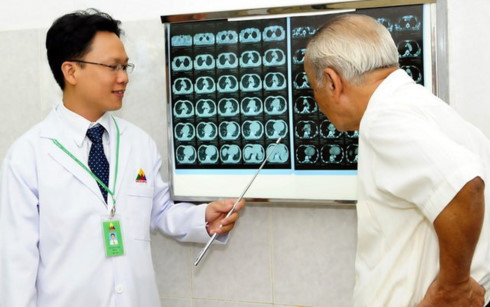Artificial intelligence: Life-saving technology for tomorrow’s Vietnam
Artificial-intelligence technology surrounds our everyday lives, in the form of voice assistants like Apples’ Siri, Microsoft’s Cortana or Amazon’s Alexa, say the computer experts.

Photo for illustration
But this technology that enables computer systems to perform tasks that normally require human intelligence in decision making extends well beyond recognizing a song or telling us the weather.
Recently the Vietnam Economic Times printed an article discussing artificial intelligence, hereinafter referred to as simply AI, with Tran Nguyen Vu,the general manager from IBM Vietnam.
According to Vu, IBMs supercomputer Watson is the most advanced AI in the health field and is changing the face of healthcare in Vietnam.
AI in Chinese Hospitals
China has one of the highest lung cancer rates anywhere in the globe, says Vu.
Roughly 600,000 people in China die from lung cancer each year and Chinese officials estimate the incidence of lung cancer among its citizens will increase to 800,000 cases per year by 2020.
It’s not just the high incidence of cancer in China that’s the problem. The issue is compounded by a lack of quality healthcare in much of the country, which means that cancers often go undetected until it’s too late.
The best estimates, says Vu, place the number of radiologists in China at 80,000 who diagnose roughly 1.4 billion computerized tomography radiology scans, more commonly referred to as CT scans, annually.
CT scans combine a series of X-ray images taken from different angles and use computer processing applications to create cross-sectional images, or slices, of the bones, blood vessels and soft tissues inside a patient’s body.
At Shanghai Changzheng Hospital in China, radiologists have been utilizing AI technology from Infervison to improve the medical diagnosis in reading CT scans and x-rays and identify suspicious lesions and nodules in lung cancer patients.
Infervison is China’s first artificial intelligence precision healthcare platform that was founded in 2017 in Beijing by PhD CHEN Kuan, who is a graduate of the University of Chicago in the US, where he studied financial and intelligent modelling.
The company, partnering with GE Healthcare, Cisco, and Nvidia works with 20 tertiary grade A hospitals in China, to perform CT scans with AI that allows for earlier diagnosis that allow doctors to prescribe treatment earlier.
China simply does not have a sufficient the number of qualified doctors,Kuan told reporters this past May. Because a doctor must serve so many patients every single day, the quality of care a patient receives also varies greatly and is often deficient.
The problem is especially acute for radiologists, he said.
Working with GE Healthcare, Cisco and Nvidia, he noted that Infervison has been able to develop and refine its technology. The company has processed roughly 100,000 CT scans and 100,000 x-rays since it started operations.
In no way will this technology ever replace doctors. It is primarily intended to eliminate much of the highly repetitive work and do it faster and more reliably than humans, added Kuan.
AI in Japanese Hospitals
IBMs supercomputer Watson is having similar positive responses in Japanese hospitals, said Tran Nguyen Vu the general manager from IBM Vietnam.
One example where it recently saved a woman’s life in Tokyo involved a situation where she had been diagnosed with leukaemia six years earlier. She received treatment but still was not healthy.
The University of Tokyo ran her genetic sequence through Watson, which found a second strain of leukaemia, Vu said. The Japanese doctors then treated her, and now she's healthy.
This isn't an isolated instance of just one such event either, underscored Vu. About one-third of the time it is used, Watson is proposing an additional diagnosis beyond that which human doctors and other medical staff detected.
With advancements in technology like this, AI provided by IBMs supercomputer Watson is poised tobe the life-saving technology of tomorrow for Vietnam.
VNF/VOV
Recommended
 National
National
Vietnam News Today (Jun. 5): PM sets off for attendance at UNOC 3 in France, official visits to Estonia, Sweden
 National
National
Vietnam News Today (Jun. 4): Vietnam - Promising Candidate for Southeast Asia’s Next Powerhouse
 National
National
Shangri-La Dialogue 22: Vietnam Highlights Some Issues of Ensuring Stability in a Competitive World
 National
National
Vietnam News Today (Jun. 3): PM Pham Minh Chinh to Attend UN Ocean Conference, Visit Estonia, Sweden
 National
National
Vietnam News Today (Jun. 2): Vietnamese Trade Mission Sounds Out Business Opportunities in United States
 National
National
Vietnam News Today (Jun. 1): Vietnamese, Japanese Firms Foster Partnership
 National
National
Vietnam News Today (May 31): Vietnam Strongly Supports Laos’s National Development
 National
National
